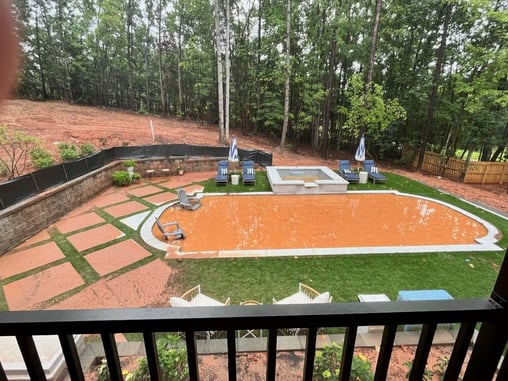
We see homeowners frequently asking questions about why pool builders charge such wildly different amounts for the same project. Comparing proposals can be challenging and sometimes exasperating, especially when it feels like you're comparing apples to oranges. Heck, sometimes it's even difficult to spot or even understand the differences between proposals.
But how do you know that a proposal covers everything needed?
In many cases it's very tempting to move forward with the cheapest proposal, but these situations can lead to surprise expenses for you, the homeowner.
While surprises can be fun in situations like birthday parties or gifts, they're not fun when they come in the form of unexpected or hidden costs in the middle of your pool project.
The following list is worthy of note-taking so that you can be sure your plans and the proposals you're reviewing clearly show everything necessary for your project to turn out as you envisioned it.

The top 7 hidden costs of an inground pool project
- Land survey
- Retaining walls
- Extra concrete
- Dirt hauling
- Landscaping
- Electrical and/or gas
- Fencing
Hidden Cost #1: Land Survey
Now, you're already excited about the idea of having a swimming pool in your backyard. But how frustrated would you be if you and your pool builder spent a lot of time, energy, and resources on planning, only to find out just before construction that your pool or patio doesn't pass local regulations or setback requirements?
Even worse, what if you found out during construction?
A land survey would help avoid either of these situations. It may not be required by your local building officials, but having a survey performed early in your planning process will help ensure you, and the installers you're considering working with, understand exactly where the pool and patio can be placed.
Hidden Cost #2: Retaining Walls
Retaining walls can get pretty expensive. And if needed, they're also extremely important to keep your pool and decking stable as well as to ensure your yard drains properly. (more on this drainage topic in a bit)
If a builder you're considering mentions that a retaining wall may be necessary, tune in, ask questions and take notes. With hopes of closing the deal, a builder may exclude the cost of a retaining wall in the beginning. Presenting a "We'll see if it's needed," plan can end up being a major surprise expense.
Be certain to get a set price on any retaining wall that might be necessary before the project starts.
*Pro Tip: If any portion of the top of your decking will be out of the ground more than 30", a retaining wall will be necessary.
Hidden Cost #3: Extra Concrete
Like retaining walls, it seems there is often not nearly enough pre-construction discussion about a pool's patio.
Many pool installers will price pool projects and drop a casual line like, "This price includes the patio."
But how much patio? And will it be enough for you and your family to enjoy the space the way you want, with the furnishings you want?
Understanding the design of your project including the total amount of patio space up front will help you budget appropriately. Some homeowners go into a project knowing that they may add more patio in the future, but being surprised by that need in the middle of construction is not a good feeling.
Again, do not overlook this important element to learning the true cost of your swimming pool project.
Hidden Cost #4: Dirt Hauling
When an inground swimming pool is built, a significant amount of dirt comes out of the ground. And by significant, we mean A LOT.
In fact, homeowners are usually shocked to see the actual amount when all is said and done. In some cases, the dirt that comes out of the hole can be spread out or dumped on the homeowner's yard or land.
But in many cases, there is nowhere to put the dirt, and it will need to be hauled away. Hauling dirt, especially in suburban areas, can be pretty expensive.
Make sure you always know if dirt hauling is included in the cost of the project.
There are many cases where the homeowner was left with a big mound of muck in their backyard, or a surprise bill to haul it away. Either way, YIKES!
Hidden Cost #5: Landscaping & Drainage
The process of putting in an inground swimming pool involves using quite a bit of heavy equipment to make the project a reality. It also involves potentially changing your property's drainage (think storm water from gutters/downspouts or run-off from snow melting).
A landscaping and drainage plan will be needed to restore your yard once the pool construction is complete and the heavy equipment leaves.
The actual landscaping work may or may not be part of your pool installer's scope, and that's okay as long as you know how to plan for it. Have a conversation with your pool builder, but know that you may need to hire a landscaper to complete this portion of the overall project.
What expenses should you plan for concerning landscape and drainage around your pool?
For starters, you'll need to seed/replace any grass in the construction area. In many cases, homeowners will go ahead and sod the area around the pool to get things back to normal right away.
Many builders will encourage sod, as they've seen many attempts at re-seeding fall victim to  heavy rainfall. In many cases, it can lead to significant issues beyond the aesthetics.
heavy rainfall. In many cases, it can lead to significant issues beyond the aesthetics.
This image shows what may have been avoided if sod was put down at the end of pool construction. In this case, rainwater washed out the backyard before new grass was established to hold the earth together.
Of course, whether you put sod down or not, you still should understand how the drainage will work with your new backyard. In short, water needs to run away from your home and away from your new pool. But which way will it go, and how will it get to a safe place without damaging anything by getting there?
Again, be sure to have an in-depth conversation with your pool installer and landscaper if you choose to hire one. As part of those conversations, you should understand the general slope of your property, the slope of your patio or pool deck, and local regulations* regarding water run-off.
*Many Mid-Atlantic states have strict regulations regarding water runoff.
We also encourage you to use the following short list as a general guide for this portion of your plan:
-Swales and channels: Can they be used or built to direct water?
- French drains: Will any existing drains need to be rerouted, or will any new ones need to be constructed?
- Gutter systems: Will the existing systems and downspouts be okay? Will any need to be modified so the water is redirected away from the home and your pool deck?
- Grading and soil types: What sort of soil do you have and what will be needed for grading and replanting?
- Maintenance of your drainage system: Will this be necessary? If so, what will you need to know to keep water flowing away from your home and pool deck?
In general, pool construction is very messy, and your yard and driveway will most likely be damaged during the process.
If your pool installer doesn't bring these topics up, make sure you do. And insist on spending a good amount of time discussing it so that you understand what is needed and the associated costs.
Hidden Cost #6: Electrical and/or Gas
Some pool builders include the electrical hook-up in their standard package, and others treat it as a separate invoice. Either way is fine, so long as you understand what is truly needed for your pool. Electrical connections for the pump may not be the only electrical requirement, as many homeowners may also desire additional outlets or fixtures for the outdoor living area surrounding the pool.
Planning for your electrical needs early in the process is a good idea. How many items will require electricity, what type of connection will each item need, and how far away is the electrical panel?
These are all questions you should ask up front, as they will help determine the true cost of electrical work needed for your project.
But what about a gas connection? You're only going to need this if you're planning on including a gas water heater or gas fire features of some sort. While this sounds like a fairly simple job for a gas-certified contractor (who, most likely, will not be your pool builder), many homeowners end up with surprises at this stage.
Why? It's at this point that they discover that the new heater or fire feature requires more fuel than your home is currently metered to receive, and an unexpected upgrade is required.
If a heater or fire feature(s) is on your project list, be sure to ask about the fuel requirements and have your pool builder or a local contractor run the calculations to determine if your current meter will be able to service your home and your pool.
Remember, the goal is no surprise costs!
Hidden Cost #7: Fencing or Approved Safety Barrier
Just about every pool in the world is required to have a fence or approved safety barrier in some way, shape, or form.
We've heard from homeowners who didn't even think about the fencing or safety barrier component of the project until the project was about to begin or was completely finished.
How does this happen?
Too easy, unfortunately.
Let's say you have a fence, but it doesn't meet local safety codes as a safety barrier for a pool. But your pool installer assumes you are hiring a fence company separately to take care of that.
BAM! Surprise fence expense.
This order of operations is not a good idea. Understand what serves as an approved fence or safety barrier for your locale. Plan the fence at the same time as the swimming pool and patio.
So, there they are, the top 7 hidden expenses of a swimming pool project.
If you have any questions, comments, or additions to the article, please don't hesitate to leave your thoughts below.
If you are interested in an inground fiberglass pool, you can request a pool quote from an independent installer near you to learn more.
Editor's note: This article was originally written by Marcus Sheridan and was updated on November 7, 2024, with current information. River Pools is a brand of inground fiberglass pools produced in a manufacturing facility in Fortville, IN. While our expertise is in manufacturing fiberglass pools, we have access to a network of installers with expertise relating to project design, installation, and pool service. We often tap into this knowledge base and share information freely with homeowners, just like you, considering installing a swimming pool in your backyard.
Topics:

